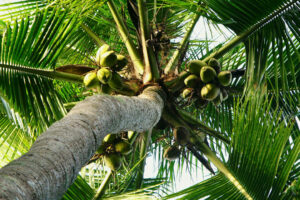By Justine Irish D. Tabile, Reporter
THE Philippine Exporters Confederation, Inc. (Philexport) said the European Union’s (EU) Green Deal will require exporters, particularly the coconut industry, to comply with the trading bloc’s policies to remain competitive.
“We had been carrying out info sessions and rendering technical assistance mainly with and through the Department of Trade and Industry — Export Marketing Bureau and the International Trade Centre (ITC) ARISE Plus Philippines program,” Philexport said via Viber.
“We hope to increase the competitiveness of the products affected by these EU policies, with particular interest in coconut and coco-based products that are not listed in the EU Deforestation Regulation (EUDR),” it added.
According to Philexport, the main exports to the EU in 2023 were office and telecommunications equipment, machinery, food products, and optical and photographic instruments.
“Most of these products may be indirectly or directly in the Carbon Border Adjustment Mechanism (CBAM) coverage,” it added.
Citing ITC Green and Inclusive Value Chains Section Associate Expert Michaela Summerer, Philexport said that the Green Deal consists of more than 50 policies, initiatives and legislative proposals in support of climate neutrality.
These include the EUDR; CBAM; and the Ecodesign for Sustainable Products Regulation (ESPR).
The EUDR prohibits the export of commodities to the EU unless they are not the product of deforestation and have been produced in accordance with the “green” legislation of the country of origin.
These include cattle, cocoa, coffee, oil palm, rubber, soy, wood, and selected derived products like chocolate, leather, and furniture.
Companies are obliged to ensure compliance with EUDR rules, which include the provision of geolocation data and a declaration filed with the EU’s Deforestation Diligence Registry.
Meanwhile, CBAM imposes a carbon tax on imported goods in high-emission industry based on the carbon intensity of production.
Ms. Summerer said that of the industries affected by CBAM, like steel, cement, aluminum, fertilizer, and electricity, the Philippines exported $22.5 million to the EU.
CBAM requires exporters to the EU to calculate the carbon emissions of their products, report their carbon content, and pay a fee based on the difference between their country’s carbon price and the EU’s.
The ESPR is a legislative framework setting design requirements for energy-related products, including household appliances, heating and cooling products, consumer electronics and lighting, textiles, furniture, building materials, and packaging.
“ESPR covers an array of product categories, including many products under Harmonized System (HS) Chapters 84 and 85, which combined are the largest exports of the Philippines to the EU, equaling $6.1 billion in 2023,” Ms. Summerer said.
She said exporters need to understand their obligation to prepare for and comply with the EU Green Deal policies.
“Proactive action is needed. Suppliers to the EU market may be indirectly affected by the EU Green Deal policies, i.e., they might not have the reporting obligation under the respective legislation yet will be asked by their buyers for relevant documentation and evidence,” she said.
